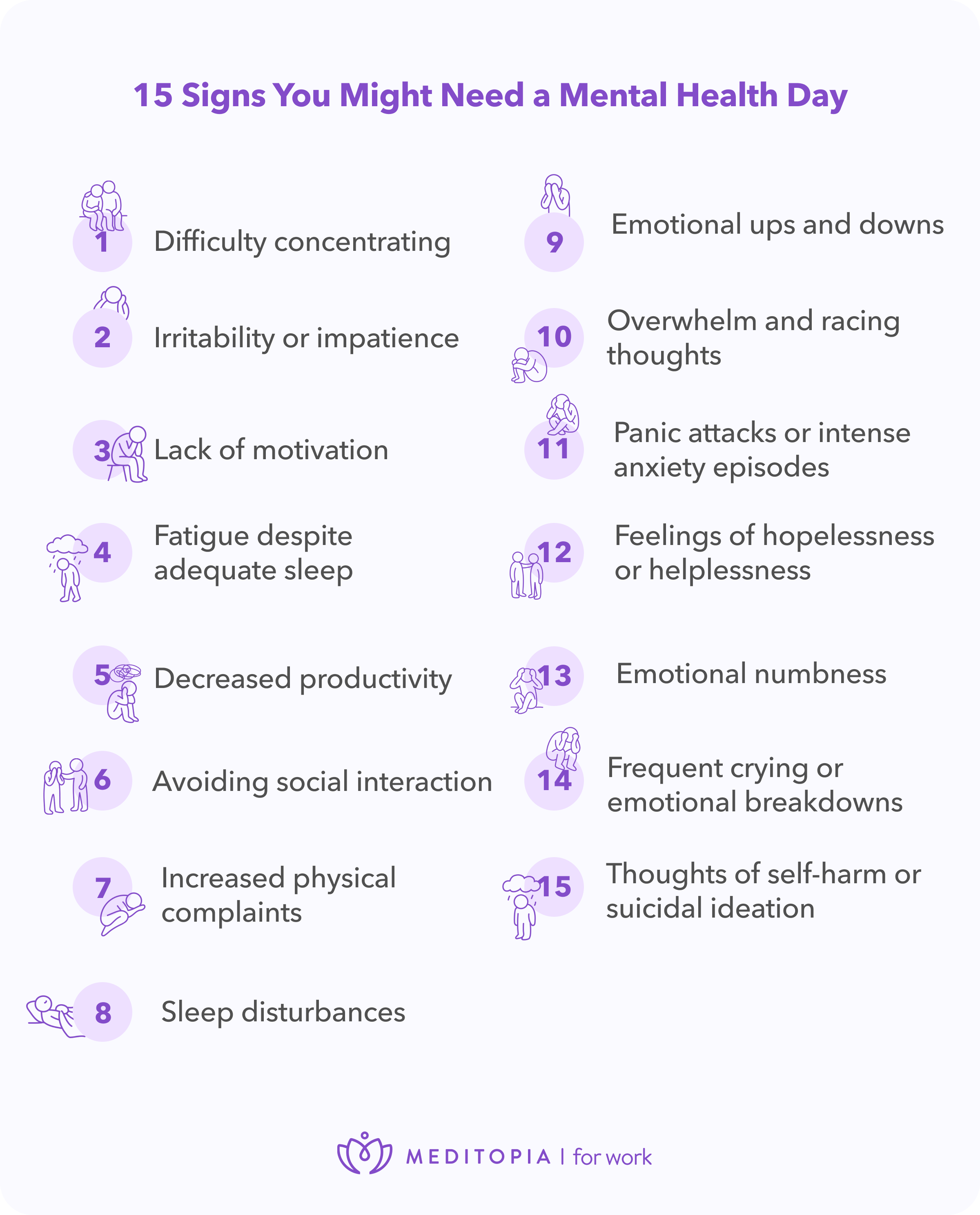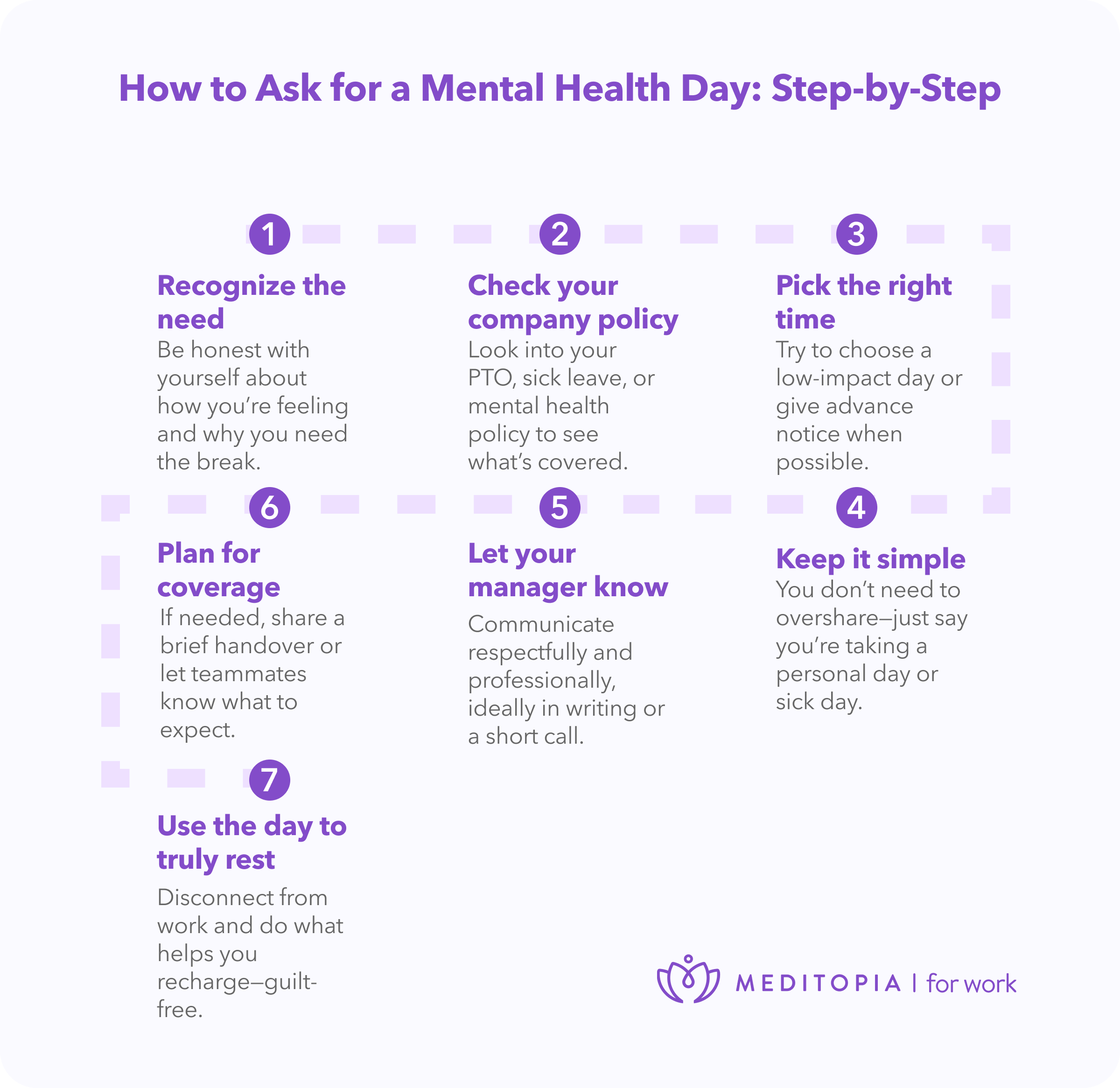Waking up with no energy, dreading the workday, feeling overwhelmed even by small tasks, sound familiar? If so, you may be wondering: can you take time off work for mental health? More people are recognizing that taking time off work for mental health isn't a weakness, it's a step toward recovery. In this blog, we’ll explore how and when to take a mental health break, what your rights are, and how companies can better support well-being.
Is It Okay to Take a Mental Health Day from Work?
Yes, it’s more than okay. It’s necessary. Taking a day off to care for your mental health is just as valid as staying home with the flu or a migraine. Yet, many still feel guilty or fear being judged for needing rest they can’t physically prove. It’s time to change that mindset.
- Over 76% of employees report work-related stress that negatively affects their mental and physical health [1].
- 60% of employees experienced symptoms of anxiety, and burnout was cited as the top reason people left their jobs [2].
Ignoring mental strain doesn't make it go away, it makes it worse. And untreated mental health issues can lead to:
- Lower productivity
- Absenteeism
- Lack of motivation
- Feelings of underappreciation
- Feeling stuck in life
- Self-confidence issues
As author Matt Haig puts it, “Mental health problems don’t take days off. Neither should our care for them.” By normalizing mental health days, we create space for real recovery, stronger performance, and a healthier workplace culture for everyone.
There isn't a law that mandates companies to provide employees with mental health days, but they do have a duty of care, and many organizations globally are including mental health leave from work as part of their policies. Here's why it's not only okay, but important, to take time off when you need it:
- It protects your long-term wellbeing: Taking a break early helps prevent deeper issues like chronic burnout, anxiety disorders, or depression. Rest is proactive care, not a luxury.
- It's beneficial to your work, too: People with poor mental health score significantly lower in focus, emotional regulation, and communication, skills critical to job performance [3]. A reset day can help you come back clearer and more engaged.
- It's your legal right (in many places): In countries like the UK, US, Canada, and across the EU, mental health is recognized under sick leave policies [4].
- You are not alone: Stigma is the main reasons why you and others may not feel confident enough asking for a mental health day. 62% of employees say they would feel guilty taking a day off for mental health, even when they need it [5].
Difference Between a Mental Health Day and Burnout Leave
It’s important to understand that while both a mental health day and burnout leave focus on your well-being, they serve different purposes. Recognizing the difference can help you choose the right type of rest when you need it most.
- Mental Health Day
- Duration: Usually one day or a few days.
- Purpose: A short break to recharge, manage stress, or prevent mental strain from building up.
- When to take it: You’re feeling drained, unfocused, or emotionally overwhelmed, but believe a day or two of rest will help you reset.
- Outcome: Often restores balance, improves focus, and helps you return to work with renewed energy.
- Burnout Leave
- Duration: Several weeks or months, depending on severity and medical advice.
- Purpose: A longer recovery period for serious, ongoing stress that has developed into burnout or related conditions like anxiety or depression.
- When to take it: You’re unable to function at work or in daily life, rest days no longer help, and symptoms are persistent and severe.
- Outcome: Provides time for deep recovery, often supported by therapy, medical treatment, or structured well-being programs.
In short: a mental health day is a reset, while burnout leave is recovery.
Signs You Might Need a Mental Health Day
We all have tough days, but sometimes, those days pile up and start affecting how we think, feel, and function. If you’ve been pushing through and wondering, “Can I take a mental health day from work?”, this is your reminder to pause and check in with yourself. If any of the signs below feel familiar, it might be time to consider a short reset:

How to Ask for a Mental Health Day: Step-by-Step
Taking a mental health day shouldn't feel like walking a tightrope. Here’s how to navigate it with clarity, professionalism, and self-compassion.

1. Recognize the Need
Start by checking in with yourself. Are you constantly tired, overwhelmed, or emotionally detached? That internal whisper that says “I’m not okay” deserves your attention.
- Why it matters: Acknowledging that you need rest is an act of strength, not weakness. It’s the first and most important step toward healing.
- Example: You notice you've been snapping at colleagues, can’t focus in meetings, and feel emotionally flat. That’s not just a bad day, it might be burnout knocking.
2. Check Your Company Policy
Before making your request, review your options. Look into your company’s PTO (Paid Time Off), sick leave, or mental health leave from work policy.
- Why it matters: Knowing what’s available helps you advocate for yourself with confidence and ensures you use the appropriate type of leave.
- Example: You find out that your company’s sick leave policy includes mental health days, so you discuss it with your manager.
3. Pick the Right Time
If it’s not an emergency, try to choose a lower-impact day or give your team enough notice to plan around your absence.
- Why it matters: Being thoughtful about timing shows professionalism and helps reduce any stress about stepping away.
- Example: You look at your calendar and see that Thursday has no critical deadlines, so you aim for that day and notify your manager two days ahead.
4. Keep It Simple
You’re not required to share personal details to your team or even HR, but if upon request, consider being honest without complicating the request too much
- Why it matters: You’re entitled to privacy, but it's also important to let your managers know what the problem is (too much work, personal issues, lack of sleep, etc).
- Example: You write: “Hi [Manager], I would like to have a short meeting with you this [Choose date]. I haven't been feeling well lately due to [briefly mention the situation here], so I'd like to discuss when I could take a mental health day. Thanks in advance."
5. Let Your Manager Know
Whether by email, message, or a short conversation, communicate respectfully and directly. Choose whichever format feels most comfortable for you.
- Why it matters: Clear communication builds trust and sets a healthy example for others in your team.
- Example: If you choose sending the email in the previous example, please wait some hours before telling your manager on Slack, they could be working on that request. If the manager doesn't respond, you could send this kind message through an official chat: "Hello, [Manager]. I sent you an email [choose date] about discussing mental health days this week, and just wanted to check if you had the chance to read it. I know some days can get hectic. Thank you! Hope everything is great."
6. Plan for Coverage
If your role involves time-sensitive work, consider a short handover or flagging tasks for teammates. Keep it brief but helpful.
- Why it matters: It eases any potential stress while you’re away and shows responsibility without overextending yourself.
- Example: You reach out to your teammates: "Hello team, just let you know I will be off from [choose date]. If you think you need something on my side in advance, please let me know so it doesn't stay on hold in my absense. Thanks in advance!" consider the proposal or the need of someone who covers you during that time.
7. Use the Day to Truly Rest
This isn’t a catch-up day for chores or emails. Step away from work and do what helps you feel grounded, sleep, unplug, walk, journal, or just breathe.
- Why it matters: You’ve earned this day. Rest isn’t a reward, it’s a basic need. And using it intentionally helps you return more present and centered.
- Example: Silence notifications, go for a slow walk, and spend the afternoon reading or napping, guilt free. If resting becomes challenging, consider Meditopia's meditations to feel more in the present in minutes.
What If You Feel Guilty Taking Time Off?
Feeling guilty about stepping away from work, even when you're struggling, is incredibly common. In fact, the person writing these lines has also felt that way 👋 In a culture that often praises overworking and “pushing through,” it’s no surprise that many people hesitate to prioritize their well-being.
But here’s the truth: guilt doesn’t mean you’re doing something wrong. It often means you’ve been conditioned to put work before yourself. And it’s time to challenge that.
If you’ve been wondering, “Can you take sick leave for mental health without seeming unreliable?”—the answer is yes. And more importantly, you deserve to. Here are a few mindset shifts to help you silence the guilt:
- You’re not lazy, you’re human: Everyone has limits. Needing rest isn’t a failure, it’s your body and mind sending a signal that you’re not okay. Listening is an act of strength.
- You don’t need to earn your rest: You don’t have to wait until you crash to justify time off. Preventing burnout is better than recovering from it.
- You're not alone—and you’re allowed to ask for support: If you’re unsure how to ask for a mental health day or feel uncomfortable, consider asking HR support for guidance. Many HR teams are trained to help with well-being requests confidentially and respectfully.
Can You Use Sick Leave for Mental Health?
Yes, you absolutely can. In many countries, taking a sick day for mental health is not only allowed, but legally protected. Just like the flu or a physical injury, mental health challenges are recognized as valid reasons for sick leave. Here’s how mental health sick leave is handled in different regions:
- United Kingdom: Sick leave can be used for mental health under the same guidelines as physical illness. You can self-certify for up to 7 days [6].
- European Union: Most EU countries treat mental health equally in sick leave policies, especially under stress or burnout conditions.
- Australia: Mental health is protected under the Fair Work Act. Employees can take “personal leave” for psychological distress.
- Canada: Mental health is recognized under sick leave and protected by provincial employment standards.
- United States: While policies vary, the Family and Medical Leave Act (FMLA) can apply to serious mental health conditions. Some states also have paid sick leave laws covering mental health.
- Ireland: No direct sick-leave-specific law was found, but comprehensive mental health rights are protected under the Mental Health Act 2001. This ensures regulated, fair treatment in mental healthcare settings.
- Singapore: Employees covered under the Employment Act are entitled to up to 14 days of paid outpatient sick leave, which includes mental health conditions, and up to 60 days of hospitalisation leave. It is explicitly acknowledged by the Ministry of Manpower that sick leave applies to both mental and physical health.
- New Zealand: Under the Employment Relations Act 2000, employees are entitled to paid sick/personal leave that can be used for mental health issues like work-related stress. Typically, this includes around 10 days per year for full-time workers, prorated accordingly.
If you’re unsure how to take time off for mental health where you live, check your company’s HR policy or local labor laws. You can also refer to government sites like:
When to Consider Professional Help
While taking time off can help ease stress and restore balance, some situations may call for more structured support. You might consider reaching out to a mental health professional if you:
- Feel persistently anxious, down, or emotionally overwhelmed
- Struggle to function in daily life or maintain relationships
- Experience sleep or appetite changes that won’t go away
- Find that rest days aren’t helping you feel better
- Notice patterns of burnout, irritability, or emotional numbness
The good news is, support is more accessible than ever. Digital mental health platforms like Meditopia offer private, on-demand therapy, mental wellness coaching, and guided content, all in 14 languages, and on your terms.
If you're wondering, “Can you take a mental health day from work?” or if taking sick leave for mental health just isn’t enough, know that ongoing support can make a real difference.
And if your company doesn’t currently offer mental health benefits, you have the power to help change that. Consider speaking with your manager or HR about introducing Meditopia for Teams, so that expert support becomes available for you and everyone around you.











.jpg)











